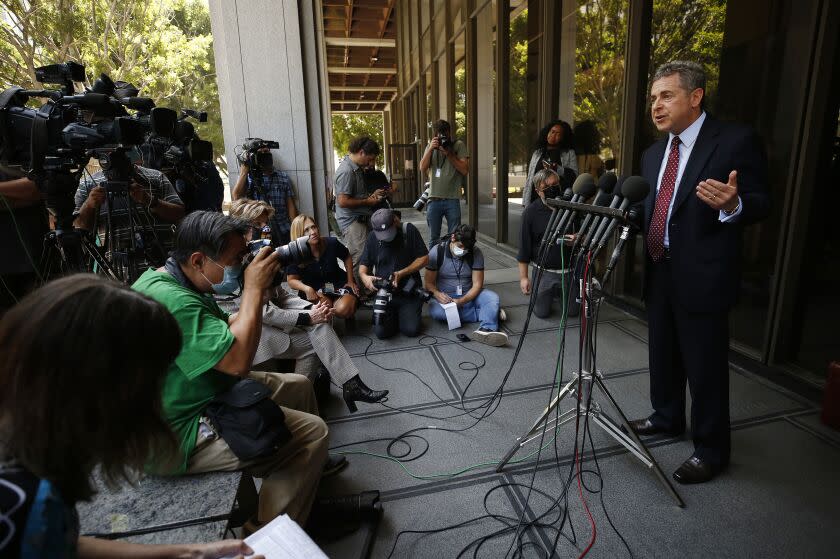
For the record:
9:40 a.m. Nov. 9, 2022: An earlier version of this story said Keya Morgan was acquitted. A mistrial was declared in Morgan’s trial after the jury failed to reach a verdict.
As a crowd of dozens shoved and jostled their way toward an overwhelmed security checkpoint on the 9th floor of Los Angeles County’s largest criminal courthouse last month actor, Scientologist and accused rapist Danny Masterson bumped up against several jurors.
But not jurors in his high-profile trial — the other one happening down the hall.
Whether it was O.J. Simpson, infamous L.A. serial killers such as the Night Stalker or Grim Sleeper, or the doctor convicted of giving Michael Jackson a fatal overdose, the 9th floor of the Clara Shortridge Foltz Criminal Justice Center in downtown L.A. has long been where the county’s most notorious — and sometimes famous — are brought to face justice.
Infamous among prosecutors, defense attorneys and court watchers, the 9th floor can always be expected to have something noir and noteworthy happening. But these are particularly busy days.
In a courtroom at one end of the hall, Harvey Weinstein is facing charges he raped several women in a trial that will include testimony from actor Mel Gibson and Jennifer Siebel Newsom, the wife of California’s governor.
At the other end, Masterson is trying to fend off accusations that he raped three fellow Scientologists in the early 2000s. The case has raised questions about the church’s efforts to bury reports of abuse against its own members.
While those two cases are drawing the most headlines, a triple homicide is also being prosecuted across the hall from the courtroom where Weinstein is being tried. And until last week, Keya Morgan, the former business manager of comic book icon Stan Lee, stood accused of stealing from the Spider-Man co-creator before his 2018 death. A mistrial was declared in Morgan’s case after jurors decided it could not reach a verdict, according to a spokesman for the district attorney’s office.
The crowded docket has attracted an only-in-Los Angeles cross-section of personalities to the 9th floor’s main hallway. It was the destination for suspected Scientology operatives, a woman desperate to introduce herself to Weinstein and a popular TikTok creator who took a break from her typical fare of cryptids and the apocalypse to make videos documenting the disgraced Hollywood kingmaker’s trial.
Steve Cooley, the former district attorney, was also seen walking by the Weinstein courtroom one morning, on his way to serve as defense counsel in a public corruption case.
In the Masterson courtroom, a sense of intrigue pervades.
Men and women in suits are suspected to be lawyers for Scientology, as the church has bristled at its faith being dragged into the center of the rape trial. A man believed by many to represent the church has attended court each day since mid-October, his back tattoos showing through a white button-down shirt.
He told The Times he was an attorney, then walked off and refused to say if he worked for Scientology. Taking handwritten notes in the courtroom, the man scrawled the word “CHILDISH” when a Masterson accuser said she was feeling dizzy and suffered an apparent panic attack on the stand last month.
A spokeswoman for Scientology said no lawyers for the church have attended the Masterson trial, calling the suggestion “offensive.”
A prominent ex-Scientologist, Mark Headley, sat in on the trial for a day when he was passing through Los Angeles. Headley worked for the church’s production company in the 1990s and said he met Masterson on the set of a short film Scientology was making in 1994.
“As Danny was walking down the hallway he gave me this evil glare,” Headley said of the greeting he got on the 9th floor.
The crowd of spectators converging to observe the trials combined with the jurors, lawyers and witnesses in the other cases playing out created a miniature mosh pit as people try to get in and out of elevators on the 9th floor. On the day of opening arguments at Weinstein’s trial, the floor’s security checkpoint was so backed up, people trying to step off the elevator were forced to ride to different floors until enough space opened up for them to fit in the hall.
Ann Donlan, communications director for the L.A. County Superior Court system, said the logjam was not a “common occurrence” and blamed the tight quarters on the fact that multiple courtrooms on the floor were conducting jury selection that day. While the court’s presiding justice is made aware when high-profile trials like Masterson’s and Weinstein’s are scheduled concurrently, decisions on trial start dates are solely based on the rights of defendants and trial court availability, Donlan said.
At the Weinstein trial, reporters whisper with both Weinstein’s defense team and the prosecutors, questioning when Gibson, Siebel Newsom or other A-list witnesses might take the stand.
For two days, a woman with short blond hair, long acrylic nails and untied shoelaces flitted around the courtroom. She moved nervously along a bench during testimony, at one point pulling out a second surgical mask to cover the one she was already wearing.
Eventually, she advanced toward Weinstein and tried to speak with him. She was quickly stopped by a sheriff’s deputy — talking to defendants in custody is illegal under California law — and has not returned to court since. A Times reporter was unable to speak with her before she left the building.
Jennifer Carmody, a 34-year-old TikToker with a half-million followers who goes by the handle “jk ultra” online, has also been a regular presence among the contingent scribbling notes in court each day. But unlike the more traditional press in the room, Carmody refers to herself as a “conspiracy theorist before it was cool” who has developed a large online following through an array of videos exploring UFOs and apocalyptic prophecies.
Despite her unorthodox material, Carmody says she’s playing the Weinstein trial straight. She believes a lot of her followers get their news only from TikTok, and that she owes them an unfiltered view of the proceedings.
“A lot of my audience doesn’t watch the mainstream media, and since this is such an important case, I wanted to cover it through a neutral lens,” she said.
Cameras have been banned in both courtrooms and the judges have restricted the number of reporters allowed in. Unlike in New York, where a crush of media parked outside the Weinstein courtroom each day to scream questions at the mogul and his team, recording is prohibited inside L.A. County courts. In all, the media presence at Weinstein’s Los Angeles trial has paled in comparison with his New York prosecution — where reporters lined up at 4 a.m. to gain access some days — but that could change as more celebrity witnesses appear.
Although Weinstein has already been convicted of rape in a previous trial in New York and settled a massive civil suit from many of his accusers, Carmody said she believes there’s a chance he’ll be acquitted in Los Angeles.
“Too often we have seen powerful people walk,” she said. “If that were to happen with Harvey, then I need to see why for myself.”
This story originally appeared in Los Angeles Times.




